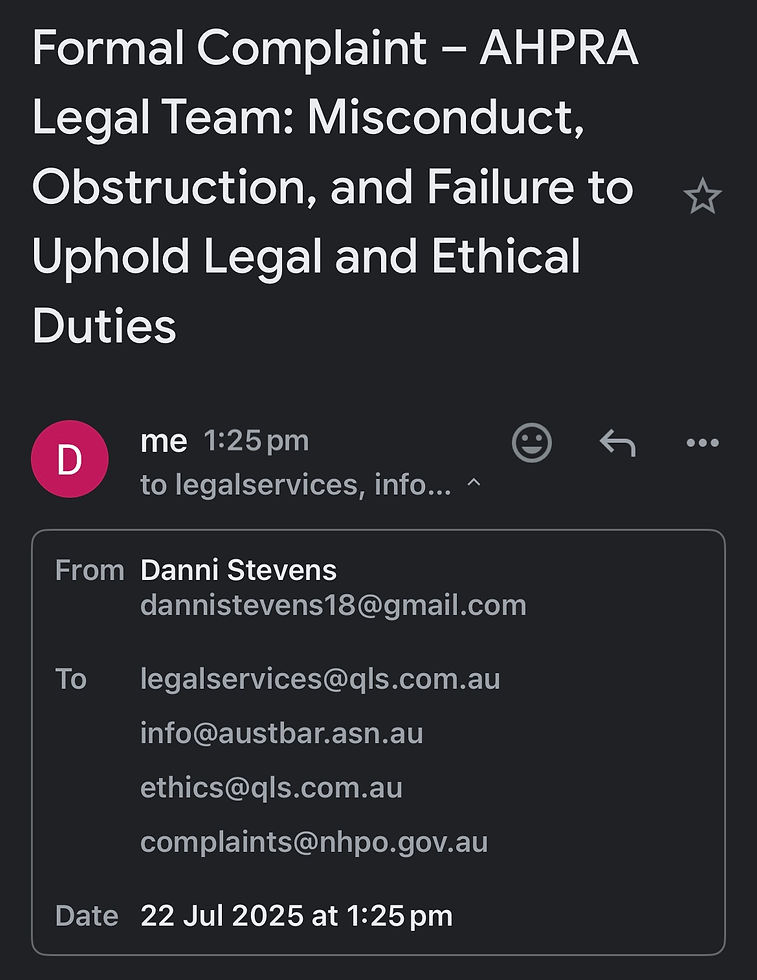
AHPRA Formal Misconduct
- agentorangechild
- Jul 22, 2025
- 5 min read
Formal Complaint – AHPRA Legal Team: Misconduct, Obstruction, and Failure to Uphold Legal and Ethical Duties
To whom it may concern,
I am writing to formally refer the legal and administrative conduct of the Australian Health Practitioner Regulation Agency (AHPRA) to the Bar Association and Legal Ethics Committee for urgent review.
On 26 June 2025, I received a letter from AHPRA (Ref: 12809802) which falsely claimed that I had failed to provide identifying particulars of the practitioner I was complaining about. This is incorrect. I had clearly named the doctor involved and included medical evidence, formal diagnoses, and references to WHO-cited research linking my condition to toxic exposure.
Despite this, AHPRA closed my complaint under section 149(1)(a) of the National Law. The justification used was demonstrably false and contradicted the evidence I submitted. Furthermore, AHPRA acknowledged that I had further material available (including medical imaging) and chose not to request or consider it before making a final decision.
This constitutes a deliberate obstruction of due process and violates the principles of procedural fairness and public protection.
This failure is not administrative — it is legal. It has now been included in Annex C of my formal submission to the International Criminal Court under Article 15 of the Rome Statute, where I have documented systemic denial of second-generation chemical harm and regulatory failure in Australia.
I am now referring AHPRA’s legal team to your office on the following grounds:
Misrepresentation of material facts
Knowingly providing false grounds for dismissal
Failing to act on medically and legally relevant evidence
Obstructing access to regulatory justice
Breaching ethical obligations under the National Law and International Law
AHPRA’s legal team have not responded to my formal rebuttal, and their actions show a pattern of systemic avoidance and professional misconduct.
I am requesting a full investigation into whether the lawyers involved in drafting, reviewing, or advising on this decision have breached their ethical obligations under Australian law and the professional codes governing legal conduct.
Please confirm receipt of this complaint. All documents referenced above are available upon request and will be included in ongoing international legal proceedings.
Warm Agent Orange Burns regards,
Danielle Stevens
We will always be a child of a Vietnam Veteran
A formal complaint has been lodged with the International Criminal Court for Crimes against Humanity. The final submission was the 1st of July 2025.
Australia ratified International treaties but failed to implement them into domestic laws.
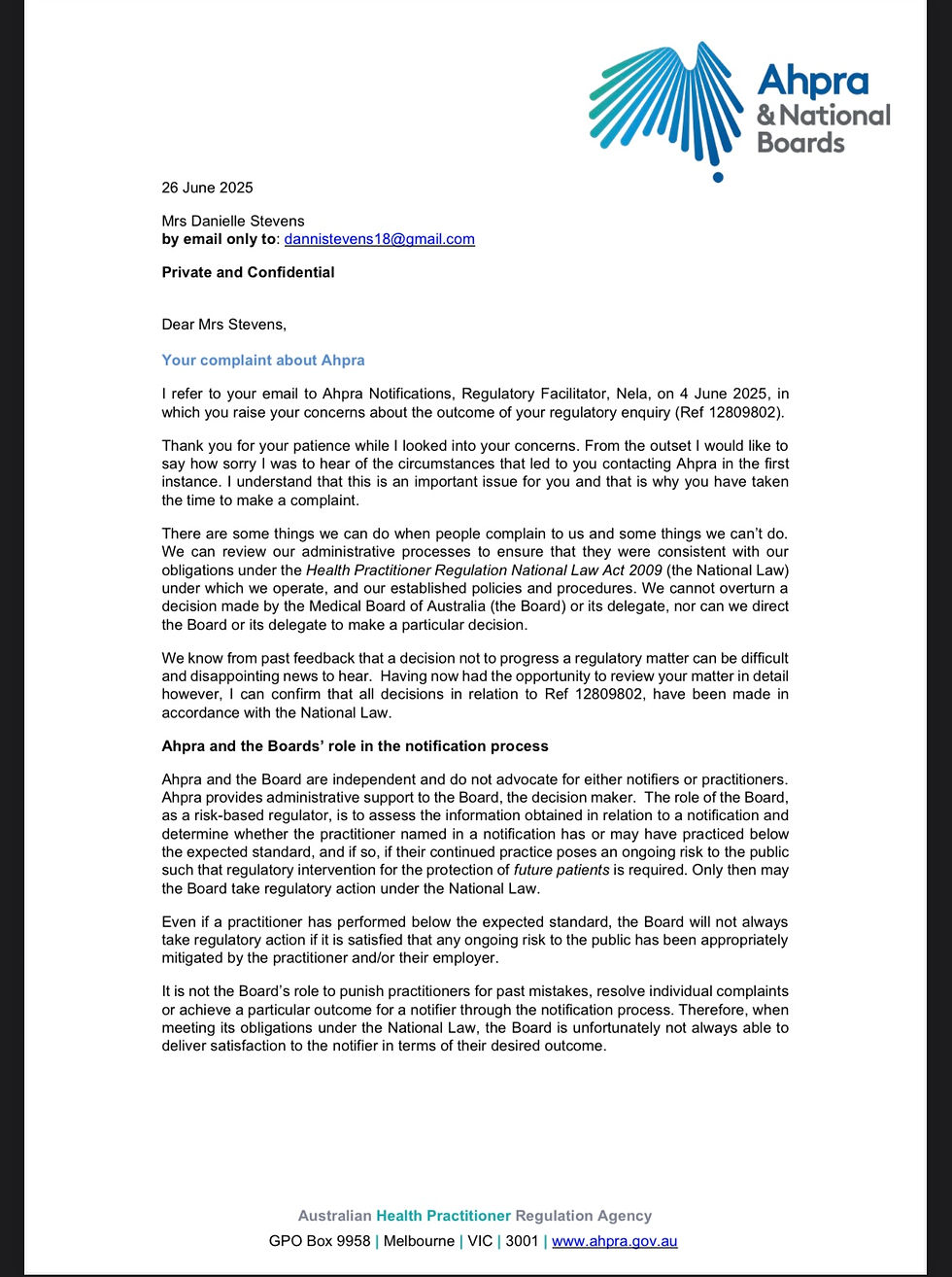
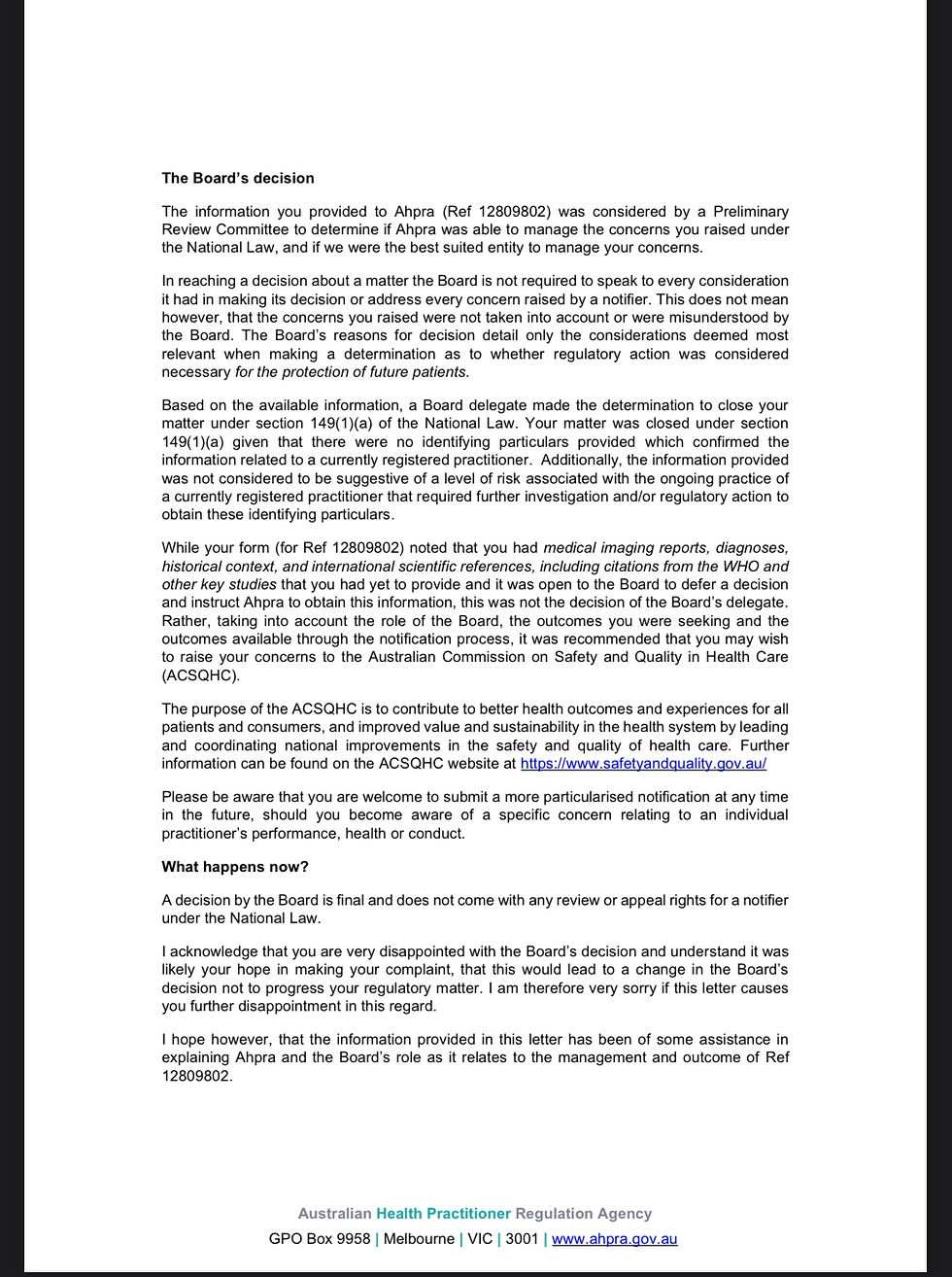
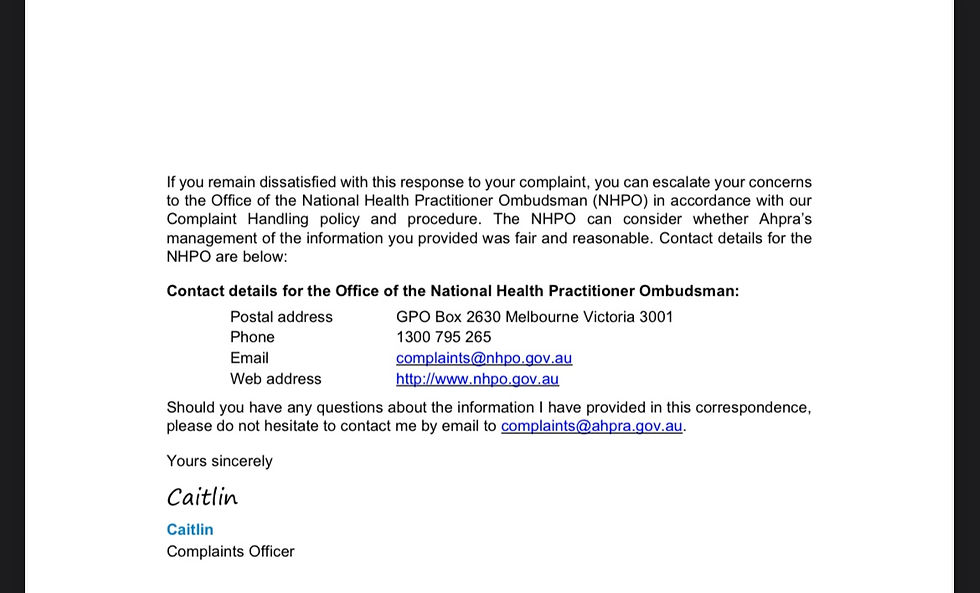
Subject: Formal Response to Complaint Outcome – Ref 12809802
26/07/2025
Dear Ahpra,
I am writing in response to your 26 June 2025 letter regarding my complaint (Ref 12809802). Your conclusion is both factually incorrect and procedurally unjust.
Contrary to your statement, I did name the practitioners involved in my complaint. The assertion that “no identifying particulars” were provided is false and demonstrably contradicted by the documentation I submitted. That alone invalidates your justification under section 149(1)(a) of the National Law.
Additionally, you acknowledged that I had further evidence available — including medical imaging, WHO-cited research, and formal diagnoses — yet the Board’s delegate chose not to request it. This is not an oversight. It is a deliberate choice to close a complaint while avoiding the evidence.
Your response demonstrates a pattern of systemic obstruction, not administrative neutrality. It reflects a regulatory culture more concerned with shielding practitioners than investigating credible harm. That harm includes medical failures linked to toxic exposure, a matter of international concern and part of a formal complaint I have now submitted to the International Criminal Court under Article 15 of the Rome Statute.
Your decision, and your failure to review what was actually submitted, is now part of that record. It will be included in Annex C of my ICC submission as an example of procedural deflection and deliberate denial of accountability.
If this agency cannot identify a named doctor in a complaint where they were clearly named, that is not an administrative limit — it is institutional blindness by design.
Your obstruction of Justice is included in the International Criminal Court submission… Lawyer up buttercup.
International Criminal Court
Annex 22/07/2025
Section Title: Regulatory Collusion and Legal-Medical Misconduct – Domestic Obstruction and International Breach
Australian Bar Association & Legal Ethics Committee – Formally notified on 22 July 2025 of alleged legal misconduct and collusion with AHPRA in the suppression of evidence, false dismissal of a regulatory complaint, and obstruction of access to remedy in breach of domestic law and international treaty obligations.
This case demonstrates coordinated misconduct between medical practitioners, their legal representatives, and the Australian Health Practitioner Regulation Agency (AHPRA), resulting in procedural failure, obstruction of justice, and multiple violations of international law.
In June 2025, AHPRA dismissed a formal complaint (Ref 12809802) regarding second-generation dioxin-linked medical harm. The stated reason for dismissal — that “no identifying particulars” of the practitioners had been provided — was factually false. The complainant had explicitly named the practitioners in their submission and included supporting documentation.
Despite this, AHPRA failed to investigate or review the complaint on its merits. The legal team representing or advising AHPRA either:
• failed in their duty of due diligence by not reviewing the provided evidence, or
• knowingly supported the false claim as a means to justify dismissal.
This constitutes legal misconduct and raises serious questions of collusion between regulatory and legal actors to suppress evidence of medical negligence and avoid scrutiny of TCDD-linked harm.
Further evidence submitted included:
• medical imaging,
• WHO-cited toxicological reports, and
• internationally recognized diagnoses consistent with second-generation exposure to Persistent Organic Pollutants (POPs), including dioxins (TCDD).
None of this was addressed. No accommodation or trauma-informed process was applied. No follow-up was made. The regulator and legal team acted in concert to dismiss the complaint with a fabricated justification, thereby:
1. Denying procedural fairness and access to remedy in breach of:
• Article 2(3) of the ICCPR,
• Article 12 of the ICESCR,
• Articles 4, 5, and 7 of the CRPD, and
• General Comments by the UN Human Rights Committee.
2. Violating Australia’s obligations under the Stockholm Convention, which mandates recognition, monitoring, and risk communication regarding toxic exposures — especially known carcinogens like TCDD.
3. Contributing to an environment of systemic denial, in which survivors of toxic harm are retraumatised, discredited, and silenced through institutional barriers that deliberately obstruct justice.
This pattern — whereby medical misconduct is shielded by legal misrepresentation and upheld by regulatory silence — fits the legal definition of administrative complicity and state-enabled abuse.
It also represents a tactic of state-level suppression of chemical war crime evidence in a civilian case — effectively a violation of the Rome Statute under the categories of:
• persecution (Article 7(1)(h)),
• inhumane acts causing great suffering (Article 7(1)(k)),
• and other acts of systemic cruelty.
This matter has now been referred to the Bar Association and Legal Ethics Committee, and the failure of AHPRA to correct the record will be included in all future documentation submitted to international human rights and criminal justice bodies.



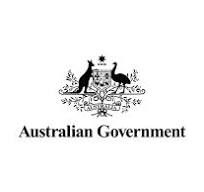
Comments